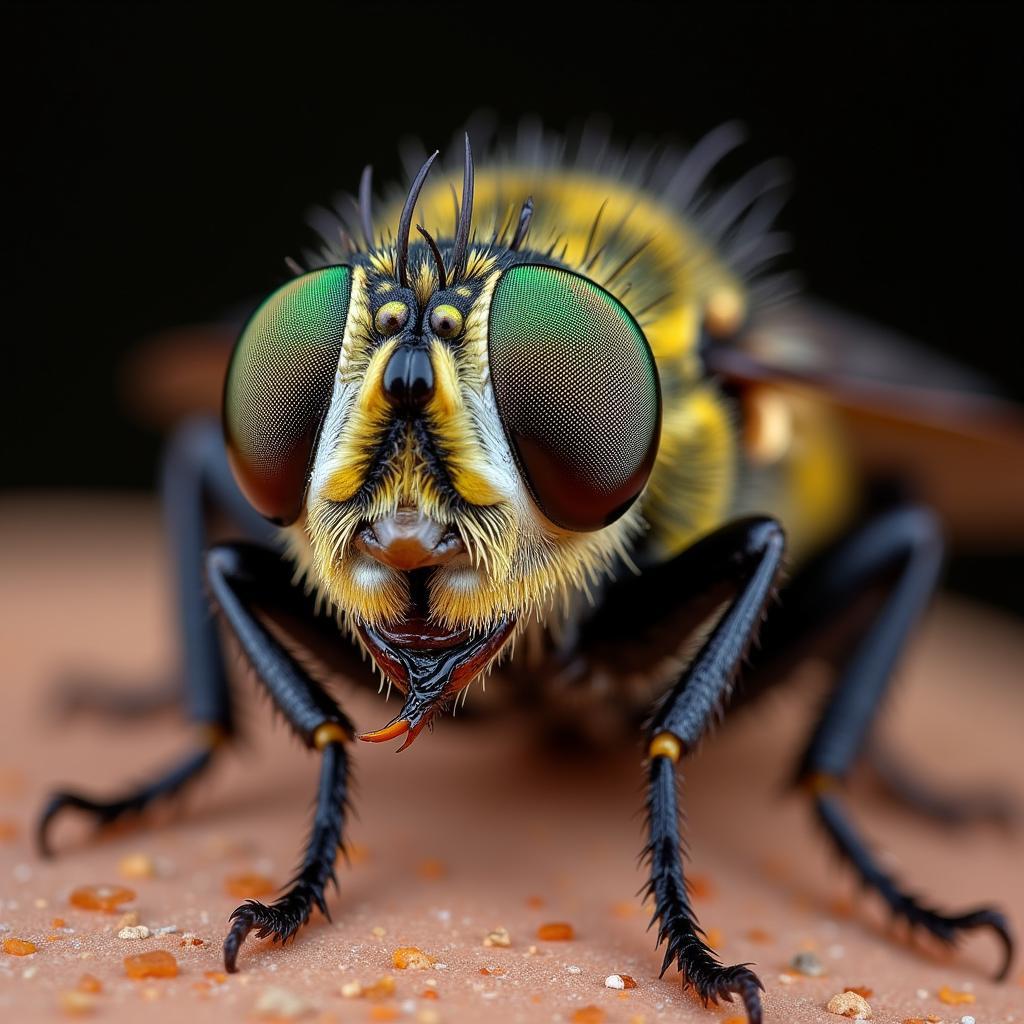Western horse flies are a common nuisance for horses and their owners, especially during the warmer months. These biting flies can cause significant irritation and even transmit diseases. Understanding their behavior, effective prevention methods, and treatment options is crucial for ensuring your horse’s well-being.
What are Western Horse Flies?
Western horse flies, belonging to the Tabanidae family, are robust, blood-feeding insects known for their painful bites. They are larger than houseflies and have distinctive iridescent eyes. Female horse flies require blood meals for egg production, making them persistent pests around livestock. Identifying these flies is the first step in effective management.
 Identifying Western Horse Flies
Identifying Western Horse Flies
Why are Western Horse Flies a Problem?
Beyond the immediate discomfort of their bites, western horse flies pose several threats to horses. These flies can transmit diseases like equine infectious anemia (EIA) and anaplasmosis. Constant biting can lead to stress, weight loss, and decreased performance in horses. Furthermore, open wounds from bites can become infected, requiring further veterinary care. Understanding the potential health risks associated with these flies underscores the importance of effective control measures.
Preventing Western Horse Fly Infestations
Several preventative measures can help minimize Western Horse Fly infestations. Maintaining a clean and dry environment in your stable and pastures is essential. Regularly removing manure and stagnant water eliminates breeding grounds for these pests. Using fly traps, sprays, and repellents can further reduce fly populations. Consider investing in physical barriers like fly sheets and masks for your horses. Implementing a comprehensive fly control program is crucial for protecting your horses.
Are you tired of dealing with a horse roached mane? Check out our guide for tips and tricks.
Treating Western Horse Fly Bites
If your horse does get bitten, prompt treatment can help prevent complications. Clean the bite area with mild soap and water. Apply a soothing ointment or antiseptic spray to reduce inflammation and prevent infection. Monitor the bite for signs of infection, such as increased swelling, heat, or pus. If you notice any of these signs, consult your veterinarian immediately. Prompt action can help prevent minor bites from turning into serious health issues.
Do you know what a nash horse is? Learn more about this fascinating breed on our website.
What are the Best Repellents for Western Horse Flies?
Choosing the right repellent is crucial for effective fly control. Look for repellents containing pyrethrins, permethrin, or DEET. These ingredients are known to be effective against horse flies. Always follow the manufacturer’s instructions for application and reapplication. Remember that some repellents may not be suitable for all horses, so consult your veterinarian if you have any concerns. Selecting the appropriate repellent can significantly reduce fly bites and protect your horse.
If you’re looking for a versatile solution, check out our pink stuff for horses guide. It might surprise you! You might also be interested in our effective horse mosquito spray to protect your horse from other biting insects. We also have a helpful guide on buckskin palomino paint horses if you’re interested in learning more about these beautiful animals.
“Regularly cleaning stalls and removing manure is the cornerstone of fly control,” says Dr. Emily Carter, DVM, equine veterinarian at Equine Wellness Center. “This simple practice can drastically reduce fly breeding grounds and minimize infestations.”
“Don’t underestimate the impact of fly bites on a horse’s well-being,” adds Dr. John Miller, PhD, entomologist specializing in equine pests. “Beyond the immediate discomfort, they can transmit diseases and lead to secondary infections. A proactive approach to fly control is always best.”
Conclusion
Western horse flies are a persistent challenge for horse owners. By understanding their behavior, implementing preventative measures, and utilizing effective treatment options, you can protect your horse from these bothersome pests. Regular cleaning, appropriate repellents, and prompt treatment of bites are key to maintaining your horse’s health and comfort during fly season. Don’t let western horse flies ruin your riding experience. Take proactive steps to keep your horses safe and fly-free.
FAQs
- What time of year are western horse flies most active?
- Are there natural repellents for western horse flies?
- Can western horse flies bite humans?
- What are the symptoms of equine infectious anemia (EIA)?
- How often should I apply fly spray to my horse?
- Are fly masks effective in preventing western horse fly bites?
- What should I do if my horse has an allergic reaction to a fly bite?
Other Resources
For more information on horse care and related topics, explore other articles on our website.
When you need assistance, please contact Phone Number: 0772127271, Email: [email protected] Or visit us at: QGM2+WX2, Vị Trung, Vị Thuỷ, Hậu Giang, Việt Nam. We have a 24/7 customer care team.